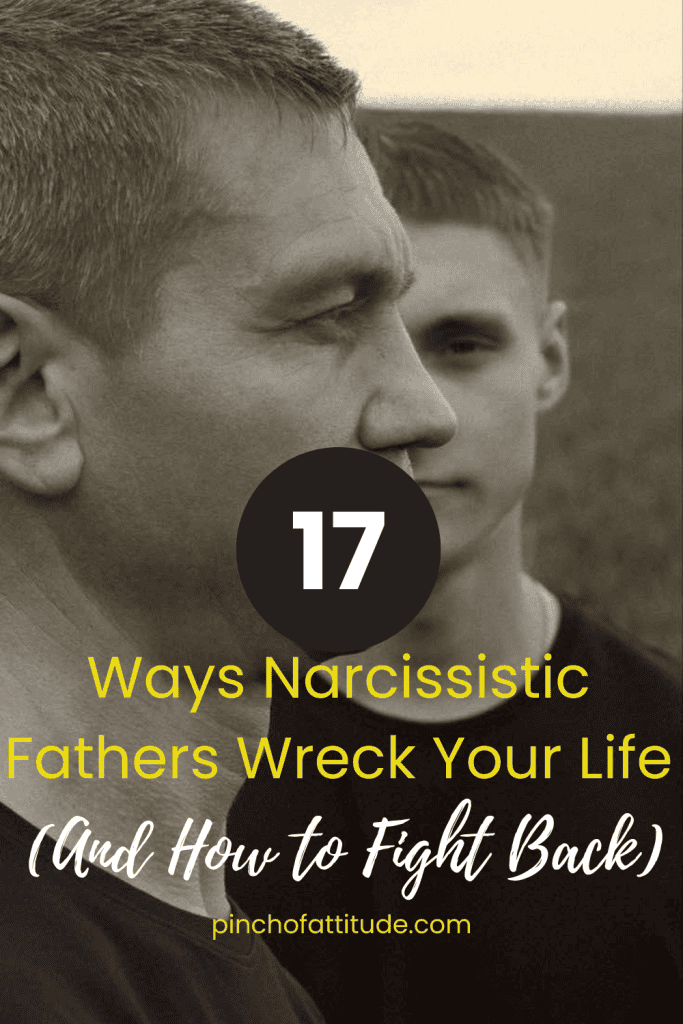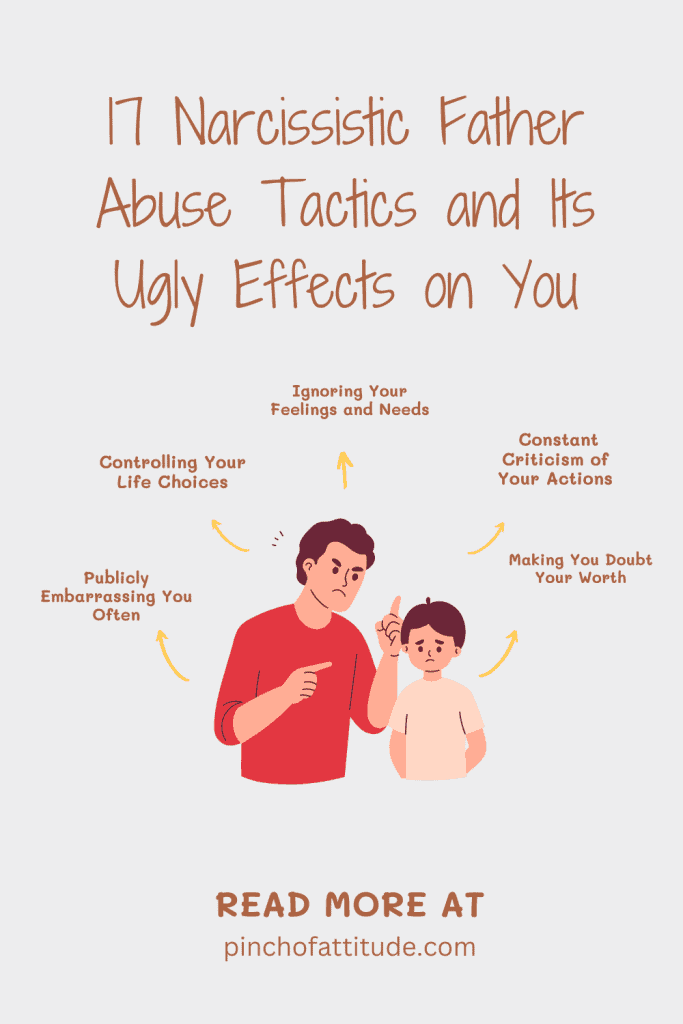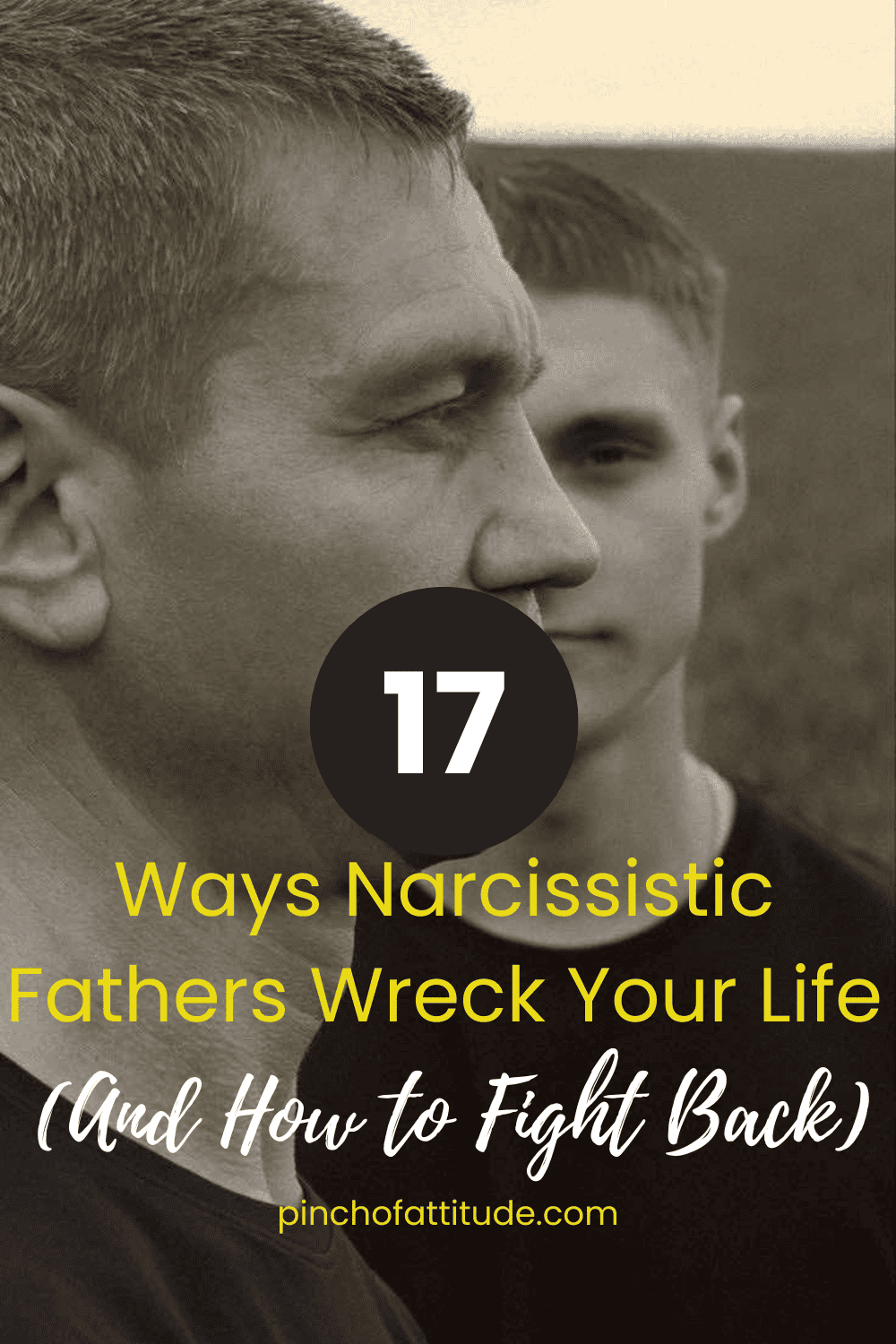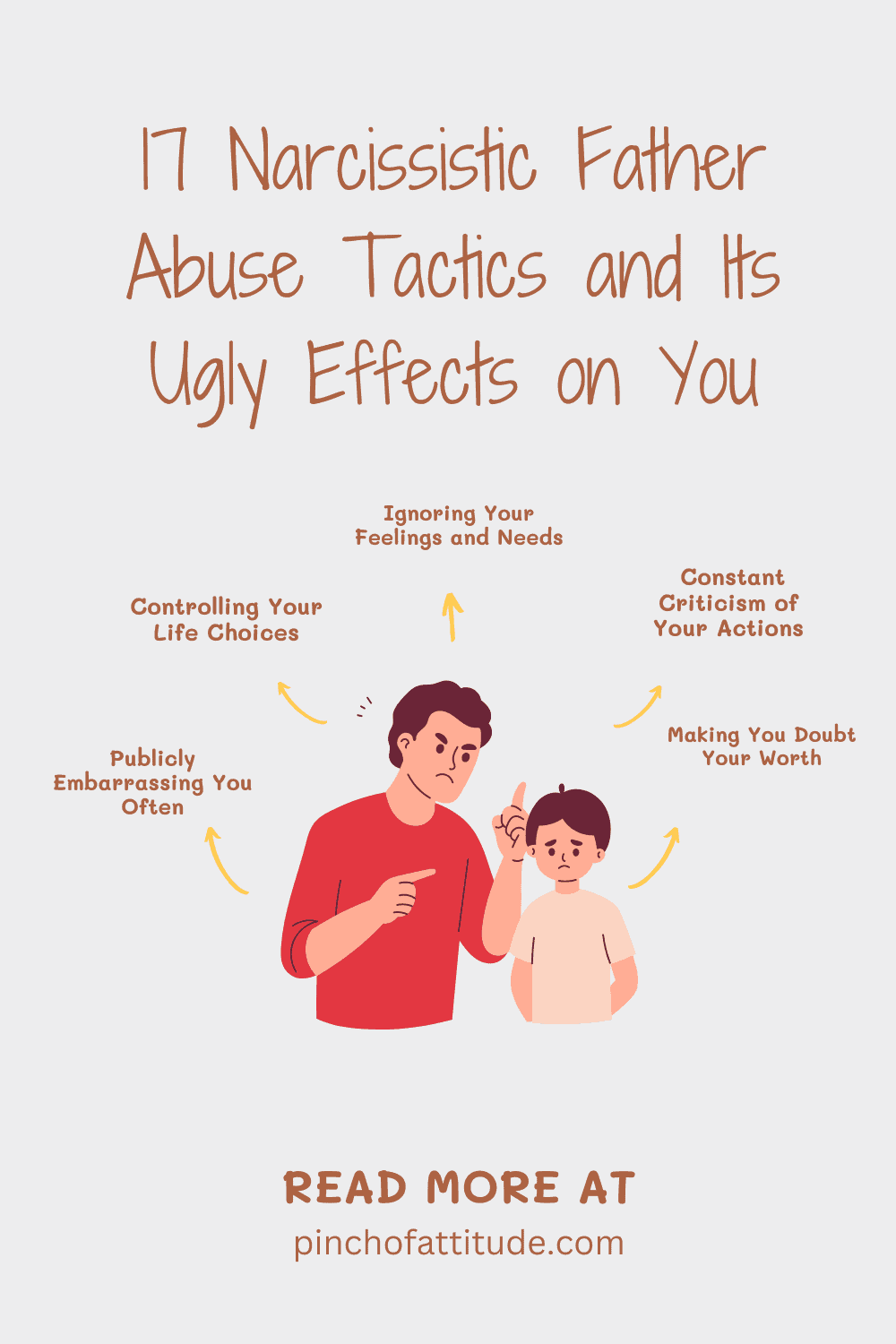Dad. The grill master, the pun-slinging jokester, the man who taught you to ride a bike.
But sometimes, behind the laughter and backyard barbecues lurks a darker reality: narcissistic father abuse.
It’s a suffocating dance of manipulation, criticism, and emotional neglect that can leave you questioning your own sanity and worth.
You crave his approval, yet every step feels like walking on eggshells.
If this is something familiar to you, you’re not alone.
Below, we’ll dissect 17 tactics these masters of emotional mayhem use, and help you untangle the web, reclaim your voice, and step out of the shadows.
- Narcissistic fathers can leave you exhausted, anxious, and disconnected from your own needs.
- Living with a narcissistic dad scars your soul. You doubt yourself, struggle to trust, and feel isolated.
- Healing from narcissistic abuse takes courage. Rediscover your identity, and understand the cycle. You’re stronger than you think.
Table of Contents
17 Different Types of Narcissistic Father Abuse

No parent is perfect, and bumps in the road are inevitable. Your mother or father can have flaws that unintentionally impact their children.
Yet, for children of narcissistic fathers, certain patterns emerge that form the ugly grip of narcissistic abuse.
After all, there’s a crucial distinction between imperfections and deliberate, manipulative behavior.
So, how do we recognize these toxic patterns? Here are 17 signs of narcissistic parenting to help you out:
1. Ignoring Your Feelings and Needs
This type of narcissistic parental abuse involves the parent treating your emotions like inconvenient background noise.
Do you crave a hug after a bad day? The room’s suddenly silent. Express excitement over an achievement? You’re met with a dismissive grunt.
Imagine pouring your heart out about a problem. The narcissistic parent may say, “You’re overreacting” or “Just get over it.”
It’s like your feelings are a faulty radio the narcissistic parent refuses to tune in to.
The effect? You learn to downplay your emotions, doubting their validity and dismissing your own needs.
2. Constant Criticism of Your Actions
Having a narcissistic father who bombards you with criticism is like living in a minefield of “should haves” and “not goods.” Forget good effort, only perfection counts.
This relentless negativity chips away at your self-confidence. You second-guess every decision, fearing the sting of criticism.
Even the simplest task becomes a mountain, shadowed by the fear of never meeting their impossible standards.
Low self-esteem becomes your constant companion, whispering doubts and fueling the belief that you’ll never measure up.
In short, it’s a suffocating environment that makes you question your sense of worth.
3. Making You Doubt Your Worth
Narcissistic fathers often see their children not as individuals but as a source of narcissistic supply, mere tools to bolster their own fragile egos.
But this comes at a cost: your own sense of worth gets chipped away with every backhanded compliment or veiled insult.
One day, you might hear, “You’re only smart because I tutored you,” and the next, “You’re nothing without my connections.”
It’s a confusing, never-ending cycle of conditional love, leaving you desperately seeking his approval while never feeling quite good enough.
You yearn for his acceptance, but his words leave you questioning your every achievement and questioning your own judgment.

4. Controlling Your Life Choices
Narcissistic fathers crave power, and your life choices become another battleground. Imagine dreaming of studying art, only to be met with sneers about “starving artists.”
Your career path? “Follow in my footsteps, that’s the only way to succeed.”
It’s like your future is pre-written, a script he insists you follow without question. This can leave a child feeling like they’re living someone else’s life.
You want to explore your own path and discover your sense of self, but you also fear the consequences of straying from his pre-written narrative.
So instead, you doubt your own intuition, question your desires, and constantly seek his approval before taking any steps.
5. Publicly Embarrassing You Often
Can you remember the sting of humiliation burning your cheeks as your father, in the middle of a crowded restaurant, launches into a tirade about your latest “failure?”
This type of public humiliation and verbal abuse, sadly, is common in children of narcissists.
It could be a mocking joke about your appearance, a belittling comment about your grades, or even a fabricated story that paints you in a negative light.
As a result, children raised by narcissistic parents may develop social anxiety. It can also damage your self-esteem and make you question your place in the world.
6. Using You for Personal Gain
For narcissistic people, children are pawns, not people.
You might find yourself pressured to excel in sports to boost your father’s social image, pushed to pursue a career he craved instead of your own passion, or even manipulated into using your connections for his benefit.
They use their children like prized racehorses, valued only for their potential to make him look good.
These manipulations aren’t subtle either. You might be showered with praise when you win, but ignored or belittled when you fall short.
This can breed resentment and a feeling of being drained, your energy siphoned off to feed his insatiable need for validation.
7. Dismissing Your Successes and Achievements
If you’re not familiar with the sting of a narcissistic father’s dismissal, it’s when your victories, big or small, are met with indifference, downsizing, or even veiled barbs.
The goal? To steal the spotlight.
He might “forget” your graduation speech, minimize your promotion to “a lucky break,” or frame your academic award as “not as good as your cousin’s.”
It’s a relentless quest to keep you off the pedestal, ensuring he remains the center of attention.
So, you start questioning your own accomplishments, wondering if they are truly significant. But don’t let him dim your inner flame.
Celebrate your victories, loudly and proudly, and surround yourself with people who genuinely appreciate your successes.

8. Forcing You to Meet Unrealistic Expectations
A narcissistic parent’s expectations aren’t based on your strengths or passions but on his warped version of his child as an extension of himself.
In his world, you are a trophy to showcase his need for admiration.
Sadly, this can result in crippling pressure and chronic anxiety. You live in fear of disappointing him, of failing to meet the ever-escalating standards he sets.
You might experience burnout, suffer perfectionism, and develop a deep-seated fear of never being good enough.
9. Manipulating You With Guilt
Does your father often lament how your choices “burden” him? How did your happiness come at the cost of his “sacrifices?”
This is the suffocating reality of parental narcissistic abuse through guilt.
He weaponizes his past struggles, his perceived sacrifices, twisting them into chains binding your every move.
Want to study abroad? “Don’t you care about your aging father?” Pursue a career path he disapproves of? “So much for family loyalty.”
As you can imagine, this can trap you in a life you don’t want, living for someone else’s approval.
10. Refusing to Acknowledge Your Boundaries
The best way to deal with a narcissistic parent is to set clear boundaries. But what if your dad refuses to acknowledge those boundaries?
Instead, your attempts to create a healthy space are met with guilt trips, anger, or passive-aggressive manipulation.
So, you learn to downplay your needs, fearing the conflict that arises when you try to assert them.
Little by little, this will chip away at your self-esteem and make it difficult to build healthy relationships with others.
11. Making You Responsible for Their Emotions
For many children raised by narcissist parents, home isn’t a haven, but a battleground.
A bad day at work? You’re met with icy silence and accusatory glances. A missed call? Brace yourself for a tirade about your “neglect” and how it’s “ruined their day.”
In this twisted reality, their happiness and misery become your sole responsibility, a burden you’re expected to manage through emotional tiptoeing.
You learn to anticipate their moods and contort your own behavior to avoid triggering them, which then leads to emotional exhaustion.

12. Comparing You Unfavorably to Others
As a child of a narcissistic parent myself, I know the sting of that constant, unfair comparison.
Do you excel at math? “Look at your brother, already coding at 10!” Master a song on the piano? “Your cousin at Julliard would play that blindfolded.”
It’s never enough, no achievement escaping the deflating echo of “someone else, somewhere else, is always better.”
This tactic even pits siblings against each other, vying for a sliver of the elusive love and approval a narcissist dad doles out sparingly.
The effect? You grow up doubting your own talents, chasing an impossible standard set by others, not by your own potential.
13. Withholding Love as Punishment
Narcissistic parents often control their children by withholding love itself.
One day, you’re basking in a rare smile, the next, banished to a shadow-land of icy silence for a dropped fork or a missed curfew.
This emotional abuse masquerades as discipline, twisting love into a weapon, a reward to dangle and then snatch away like a fickle puppeteer.
So, you start doubting yourself, questioning what you did “wrong” to lose the fleeting warmth, internalizing the blame for their manipulative coldness.
But your love should not be collateral for obedience. You deserve unconditional love and support, not bartered like a cheap trinket.
14. Threatening You With Abandonment
“If you don’t do as I say, you can find another place to live!” “Don’t you dare talk back, or you’ll lose everything you have!”
These are but a few common phrases narcissistic parents use to abuse their children.
They use your deepest fear of isolation and loneliness to control your every move, turning your home into a hostage situation.
This is why children of narcissists grapple with a constant sense of insecurity.
They fear that every misstep might trigger the ultimate punishment: being cast adrift, unloved, and unwanted.
This can lead to anxiety, a desperate need to please, and a crippling fear of asserting your own needs or opinions.
15. Invading Your Privacy Regularly
Narcissistic parents lack basic respect for your boundaries and treat your personal life like an open book.
From snooping through phones to demanding passwords, they abuse their children through invasions of privacy.
This breeds secrecy, mistrust, and a suffocating lack of autonomy. Trust feels risky, and vulnerability is a weakness to be exploited.
So, many narcissists’ children just learned to hide their true selves, fearing judgment and manipulation.
16. Using Anger to Intimidate You
A narcissistic parent will often weaponize anger to dominate and control.
A single misstep, a questioning glance, can trigger a volcanic eruption, leaving you scrambling to appease the emotional firestorm.
This form of narcissistic abuse can morph into self-blame, where the child may begin internalizing the responsibility for their parent’s rage.
But remember, your father’s anger is not your fault. It’s a weapon he wields to maintain control, not a reflection of your worth.
You have the right to express yourself without cowering under the shadow of his rage.

17. Denying Any Form of Abuse Happened
Was there ever a time when you’re talking about a painful memory, only to be met with a blank stare and a chilling, “That never happened.”
This gaslighting tactic, sadly common for narcissistic parents, is their final power play.
They twist your reality, denying, minimizing, or even blaming you for their own abusive behavior.
Adult children of narcissists often grapple with self-doubt because of this abuse.
Sometimes, it may even lead to isolation, confusion, and a reluctance to share your experiences for fear of being labeled “dramatic” or “unstable.”
Signs You Are a Victim of a Father’s Narcissistic Parenting
Recognizing patterns of manipulation and control in a narcissistic family can be the first step toward healing.
If you’ve ever felt belittled, silenced, or emotionally manipulated by your father, here are some signs you might be a victim of narcissistic father abuse:
- You’re constantly seeking approval, but never feel good enough. Because of your dad’s unrealistic expectations, you strive for ever-higher achievements. This can lead to exhaustion, anxiety, and a disconnect from your own passions.
- Your achievements are overshadowed by your father’s self-importance. Every milestone, big or small, gets eclipsed by his inflated ego. This can breed resentment and a sense of emotional isolation.
- You feel responsible for your father’s emotions and well-being. Every frown becomes your fault, every outburst a burden you must shoulder. Over time, you start feeling depleted and begin questioning your right to have your own feelings.
- Your opinions are often dismissed or ridiculed by him. This constant invalidation chips away at your confidence, leaving you hesitant to express yourself and doubting the value of your own perspective.
- You’re frequently guilt-tripped or manipulated by your father. This constant pressure to bend to his will leaves you feeling trapped. Do you respect yourself or succumb to his manipulative tactics?
- Your father’s love and attention feel conditional and inconsistent. This inconsistency breeds confusion and insecurity. It can make you feel like you never know which version of him you’ll encounter next.
- You’re often the target of your father’s anger or criticism. And when you’re constantly bombarded with negativity, you become anxious, and you develop a deep-seated belief that you’re somehow “wrong” or deserving of his ire.
- Your personal boundaries are regularly violated or ignored. But every boundary crossed damages your sense of autonomy. This is why you feel controlled and powerless within your own life.
- You feel like you’re walking on eggshells around him. This constant vigilance can warp your reality, leaving you with an ever-present knot of anxiety in your stomach.
- Your self-esteem is low due to his constant belittling. You probably hesitate to reach for your full potential. Instead, you’re forever seeking validation from the very person that made you doubt yourself in the first place.
What Is the Effect of Living With an Abusive Narcissistic Father?

There are many negative effects of parental narcissism, and pinpointing the worst one is impossible because the scars they leave are multifaceted.
Arguably, the most insidious consequence is the shattered sense of self.
In an environment devoid of unconditional love and empathy, children of narcissistic parents may internalize their father’s negativity, developing low self-esteem, chronic self-doubt, and a tendency to downplay their accomplishments.
This lack of positive validation can even breed narcissistic traits themselves, as a coping mechanism to navigate the world with the same lack of empathy they experienced.
The constant criticism and emotional manipulation damage their ability to trust others and form healthy relationships, leaving them feeling isolated and emotionally stunted.
In essence, the worst effect of living with an abusive narcissistic father is the warping of who you are at your core.
What’s the Best Approach to Recover From a Father’s Narcissistic Abuse?
Knowing the signs of a narcissistic parent is only the first step to healing from narcissistic abuse.
I, myself, grew up with a narcissistic mother, and this is what I did:
Step 1: Develop and Strengthen Your Sense of Self-Identity
Children who grow up with a narcissistic father often lose touch with their inner compass. To break free, you must reconnect with your passions, dreams, and values.
Explore new interests, reconnect with forgotten hobbies, and listen to the whispers of your own heart.
Step 2: Explore Creative Outlets for Your Emotional Expression
Whether it’s painting the storm within, dancing through the shadows, or weaving your story into poetry, explore outlets that resonate with your soul.
Give voice to the unspoken pain, channel the anger into a fiery song, and let your tears water the seeds of healing within.
Step 3: Educate Yourself About Parental Narcissism
Knowledge is power. Understanding the dynamics of parental narcissism can dismantle self-blame and illuminate the patterns you experience.
Explore resources on various types of narcissistic abuse, from the grandiose narcissistic parent to the subtler manipulation of a covert narcissistic dad.
Learn about the common narcissistic behaviors associated with narcissistic personality disorder, and how these behaviors impact children.
This knowledge will help you validate your experiences, understand your dad’s actions without excusing them, and empower you to set healthier boundaries in the future.
Step 4: Consider Limited or No Contact if Necessary
Maintaining a relationship with your parents, especially a narcissistic one, is a personal choice.
Don’t feel pressured to endure further abuse in the name of obligation. Sometimes, limited or no contact is the healthiest option.
Step 5: Build a Strong Supportive Network of Trusted Friends and Loved Ones
Children raised by a narcissistic parent often struggle with trust and forming healthy relationships.
Breaking free from isolation and building a strong supportive network is important for healing.
Lean on trusted friends, family members, or even support groups for survivors of narcissistic abuse.
Related Posts
- 10 Types of Narcissistic Fathers and How They Mess With You
- 15 Damaging Signs of a Covert Narcissist Father You Must Know
- 13 Narcissist Father Traits You Don’t Expect to See
- What Is It Like Growing Up With a Narcissistic Father? Here’s My Story
- How to Heal From a Narcissistic Father: 11 Helpful Ways So You Can Start Right!
Frequently Asked Questions
What are effective coping strategies for adult children of narcissistic fathers?
To cope with the effects of narcissistic father parenting, establish boundaries, seek therapy, prioritize self-care, and build healthy relationships.
Can a narcissistic father love their child?
People with narcissistic personality disorder can struggle with genuine love but may show intermittent affection. It often lacks empathy and is conditional.
What is the trauma of a narcissistic father?
The trauma of a narcissistic father includes emotional abuse, low self-worth, and distorted identity. The effects of narcissistic parenting ripple into adulthood, impacting relationships and self-esteem.
How does narcissistic abuse differ from other forms of parental abuse?
Narcissistic abuse involves manipulation, gaslighting, and exploitation, focusing on the abuser’s needs. It differs by its psychological nature compared to neglectful parental abuse or even physical abuse.
What resources are available for children or adults dealing with narcissistic parental abuse?
Support groups, therapy, and online forums offer solace and guidance for adult children of narcissistic parents. These resources provide understanding and coping strategies.




